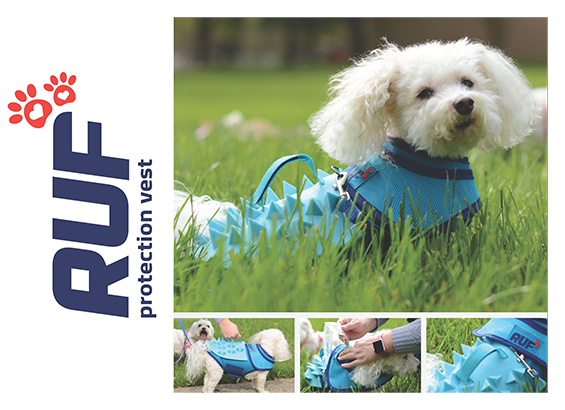

Hines College of Architecture and Design senior Industrial Design student, Antoinette Louw, recently placed second in the 2020 annual International Housewares Association Competition for her product “RUF Protection Vest,” a multi-layered dog protection vest designed to help shield small dogs against attacks from other canines.
Louw conceived the product as part of her junior design studio in Spring 2019, led by Industrial Design professor George Chow, where students were charged to cultivate human-centered design. Each student found ten people with problems or situations in which design could alleviate the current issue.
Inspiration for the Louw’s design came from her mother’s coworker, whose dog was attacked by a stray dog on their daily walk. As an owner of two small dogs, Louw was passionate about finding a solution to this problem. She decided to develop a wearable to protect small dogs from aggression by other dogs.
The process involved participatory design, in which Louw worked with three other dog owners to test out her prototypes. Each week during the trial period, she checked in with the owners to see what was working and what needed to be adjusted. Louw also collaborated with a local veterinarian to curate the proper materials and other tactical design strategies that would aid in the design.
The project took two months to develop from preliminary research to its final design. The idea of a human-centered design remained the primary focus throughout the entire process.
“You have to work with other people to create something exceptional,” Louw said. “It is impossible to work in isolation and think that just because you are designing something, the world is going to love it. When you put the product in someone else’s hand, they have a completely different view of what you have created.”
The final product, “RUF Protection Vest,” was built on five strategic design aspects: (1) rubber spikes to deter and make jaw contact harder, (2) a taste deterrent package built into the collar creating a gag reflex when encountered, (3) a ballistic nylon insert for protection around the dog’s more vulnerable areas, (4) a handle made for easily picking up the dog when in danger, and (5) 100% cotton material to ensure the dog remains cool.
The Hines College’s Industrial Design (ID) program follows a holistic approach to product design, challenging students to understand the entire process from design to fabrication. Unlike other Industrial Design programs that leave out the actual making of a final model, Hines College students see their products through to final fabrication. Understanding the design to fabrication process helps students realize they cannot design products that are not possible to recreate.
“The ID program has given me a sense of humility,” Louw reflected on her time at UH. “I want to create products that will truly help people in need rather than design for myself.”
As a result of her award, Louw will travel to Chicago March 12-17 to exhibit her product at “The Inspired Home Show,” the largest home goods show in the United States, welcoming over 500,000 people.